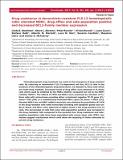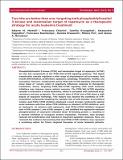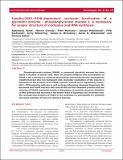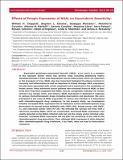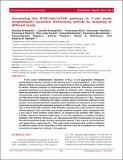Search
Now showing items 1-10 of 32
Drug-resistance in doxorubicin-resistant FL5.12 hematopoietic cells: elevated MDR1, drug efflux and side-population positive and decreased BCL2-family member expression
(2017-12-06)
Chemotherapeutic drug treatment can result in the emergence of drug-resistant cells. By culturing an interleukin-3 (IL-3)-dependent cell line, FL5.12 cells in the presence of the chemotherapeutic drug doxorubicin, we ...
Targeted therapy for hepatocellular carcinoma: Novel agents on the horizon
(2012-03-31)
Hepatocellular carcinoma (HCC) is the most common liver cancer, accounting for 90% of primary liver cancers. In the last decade it has become one of the most frequently occurring tumors worldwide and is also considered to ...
Two hits are better than one: Targeting both phosphatidylinositol 3-kinase and mammalian target of rapamycin as a therapeutic strategy for acute leukemia treatment
(2012-05-04)
Phosphatidylinositol 3-kinase (PI3K) and mammalian target of rapamycin (mTOR) are two key components of the PI3K/Akt/mTOR signaling pathway. This signal transduction cascade regulates a wide range of physiological cell ...
Insulin/IGF1-PI3K-dependent nucleolar localization of a glycolytic enzyme – phosphoglycerate mutase 2, is necessary for proper structure of nucleolus and RNA synthesis
(2015)
Phosphoglycerate mutase (PGAM), a conserved, glycolytic enzyme has been
found in nucleoli of cancer cells. Here, we present evidence that accumulation of
PGAM in the nucleolus is a universal phenomenon concerning not ...
Healthy CD4+ T lymphocytes are not affected by targeted therapies against the PI3K/Akt/mTOR pathway in T-cell acute lymphoblastic leukemia
(2016-08-01)
An attractive molecular target for novel anti-cancer therapies is the
phosphatidylinositol 3-kinase (PI3K)/Akt/mammalian target of rapamycin (mTOR)
pathway which is commonly deregulated in many types of cancer. Nevertheless, ...
Antitumor Mechanism of the Essential Oils from Two Succulent Plants in Multidrug Resistance Leukemia Cell
(2019-08-26)
Drug resistance remains a major challenge in the treatment of cancer. The multiplicity
of the drug resistance determinants raises the question about the optimal strategies to deal with
them. Essential oils showed to ...
Effects of ectopic expression of NGAL on doxorubicin sensitivity
(2012-10-20)
Neutrophil gelatinase-associated lipocalin (NGAL, a.k.a Lnc2) is a member of the lipocalin family which has diverse roles including stabilizing matrix metalloproteinase-9 from auto-degradation and as siderocalins which are ...
Harnessing the PI3K/Akt/mtor pathway in T-cell acute lymphoblastic leukemia: Eliminating activity by targeting at different levels
(2012-08-09)
T-cell acute lymphoblastic leukemia (T-ALL) is an aggressive malignant hematological disorder arising in the thymus from T-cell progenitors. T-ALL mainly affects children and young adults, and remains fatal in 20% of ...
Analysis of the B-RAFV600E mutation in cutaneous melanoma patients with occupational sun exposure
(2014)
Sun-exposure is one of the risk factors associated with the development of a cutaneous neoplasm. In melanoma, the Ras-Raf-MEK-ERK (MAPK) signaling pathway is constitutively activated through multiple mechanisms, including ...
Ras/Raf/MEK/ERK and PI3K/PTEN/Akt/mTOR inhibitors: Rationale and importance to inhibiting these pathways in human health
(2011-03-11)
The Ras/Raf/MEK/ERK and PI3K/PTEN/Akt/mTOR cascades are often activated by genetic alterations in upstream signaling molecules such as receptor tyrosine kinases (RTK). Integral components of these pathways, Ras, B-Raf, ...

